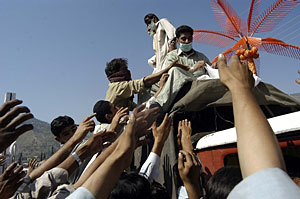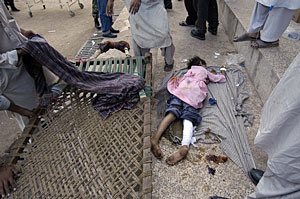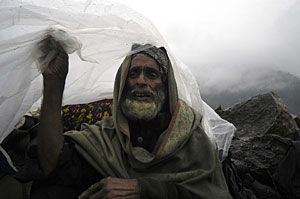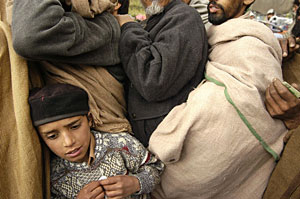 |
 | |||||||||||||
The Reality of Pakistan
|
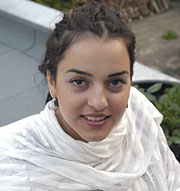 |
||||||||||||
|
I am sitting in my house in Tehran watching 'Sex and the City' on a DVD, which sometimes can make you really happy in this town. Later, when the news starts, there is a report on an earthquake in Pakistan. At the same time my phone rings. It's J.P. Pappis from Polaris Images, my agency. He asks if I can go cover the earthquake in Pakistan. I told him I will try to apply for a visa and go there as soon as possible. The next day I am in the Pakistani embassy. They tell me to come back in three days. They need time to confer with the government in Pakistan. I say, "Sir, I should be there today." But no visa can be given.
Quickly I put my stuff in an overpriced hotel room and I rent a car to go to Balakot, the worst-hit area. Traffic is so dense that I arrive at 19:00 at night. The sun is down so no pictures. People are waiting for help in the pitch-black darkness since all electricity is down.
I am lost here. There are no other journalists, and if there are I can't see them. There is no media tent or anywhere else to get information on the situation. One family is sitting around the fire, without a tent. I take some pictures of them. On the way back to the car I see two photographers sitting next to the road. I introduce myself and ask them if there is any place for journalists to stay tonight. They tell me they travel back and forth to Islamabad everyday: there is no place to stay in Balakot.
First I want to sleep in the car. I am dead tired after the long trip from Iran. But then I think, if these two big guys aren't staying, how can I spend the night here? After some hours walking around in darkness, I decide to drive back to Islamabad.
The next day I go to Muzzafarabad in Kashmir province. The place would be a paradise on earth were it not for the earthquake. I arrive early in the morning and get to work. The whole city is destroyed and teams are taking dead bodies from under the rubble. There is still hope for some survivors. Back in Islamabad I send my first pictures.
Thinking I am a part of the army of aid workers that still hasn't arrived, they try to stop me, ask me for help. I hold up my hands helplessly and gesture that I can't do much. After that they make way for the car and I drive up to their destroyed town.
Earthquakes are horrible events. Not only to be in – I have been through a couple in my hometown of Tehran, Iran – but also to cover as a photojournalist. Besides the lack of electricity, water and telephone lines, the story is a big ticking deadline. In the ironclad laws of news reporting an earthquake falls under the 'one-dimensional category' – which basically means that attention drops as the days fly by. Victims are forgotten as other news grabs people's attention.
I covered an earthquake before in Bam, Iran. I was outside of the country when the quake took place on Dec. 26, 2003. I arrived on the 30th. When I arrived colleagues said, "You're late, it's finished." That was cynical, but true.
The town is partly built on a mountain flank, so I walk up to a higher part of town. It's still raining very hard and like the quake victims, I start looking around for a piece of plastic to cover my equipment.
A bit further downtown people are standing in line for blankets and food provided by a local student Islamic Party. While women and men were both waiting, only the men receive aid. "Why don't you help the women?" I ask one of the young students. "Why don't you put down your camera and help us?" he replies. I tell him people who can't be here can see the distress of Balakot through the pictures of photographers.
Any photographer who visits a disaster scene will be bothered by his or her conscience. At least, that's what happened to me after the student told me to hand out blankets. Will these pictures really help these people or will they only help my portfolio?
Spending the night in Balakot is once again difficult. Some photographers can stay with aid teams from their countries, but the Iranian team is somewhere higher up in the mountains. Sending pictures through my BGAN-satellite modem is also not possible. All connections are down due to technical problems with the Inmarsat satellite.
Later, I arrive back home in Tehran and visit some Iranian magazines, giving them some of my pictures. When I come home I want to put on another 'Sex and the City' episode. But as I turn on the DVD player and see the happy face of Sarah Jessica Parker with her relationship and shoe problems, I think of the women and children in the cold mountains of Pakistan. I turn off the television; I don't feel like watching anymore.
© Newsha Tavakolian
Dispatches are brought to you by Canon. Send Canon a message of thanks. |
|||||||||||||
Back to November 2005 Contents
|
|
